Award Ceremony 2025
The first FUTURE EDUCATION Early Career Award was presented on 28 August 2025 as part of the EARLI Conference 2025 at the University of Graz to young female researchers who have achieved outstanding research results. This year, the award was presented in four categories, which are assigned to the clusters of the FUTURE EDUCATION research network.
Papers could be submitted if they were published in a scientific journal as part of a dissertation or within two years of completing the dissertation. The submitted papers were subjected to a single blind peer review process, whereby each paper was reviewed by both a reviewer from the FUTURE EDUCATION network and a reviewer from the EARLI community with a corresponding research focus.
Congratulations to all four award winners!
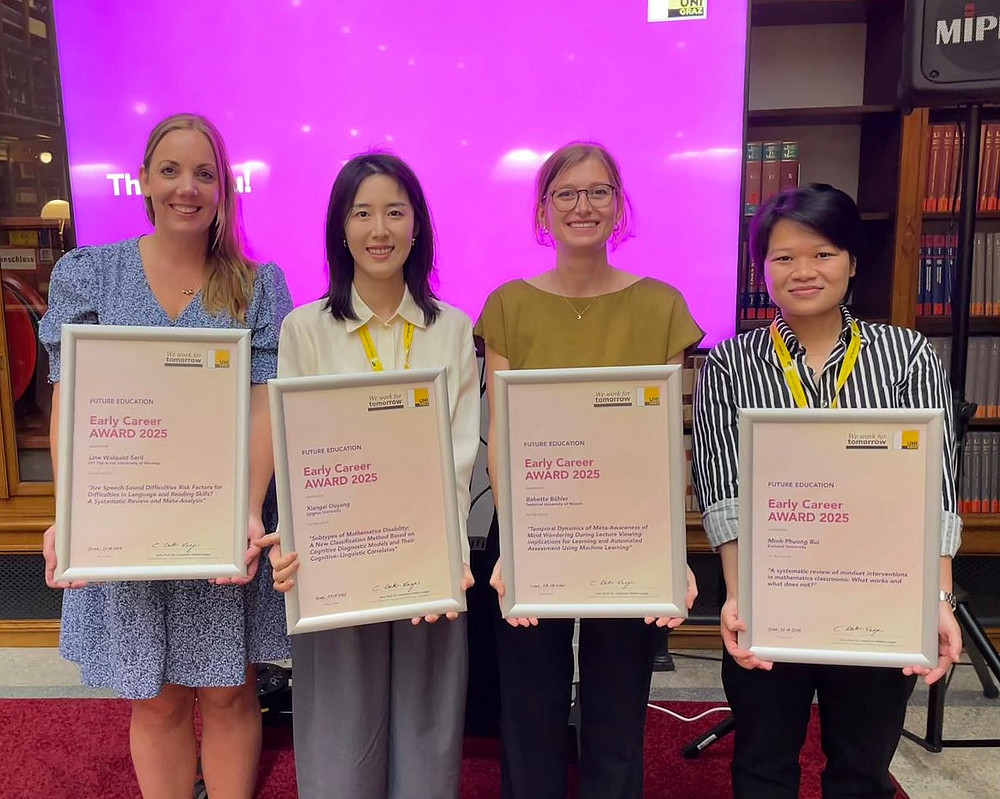
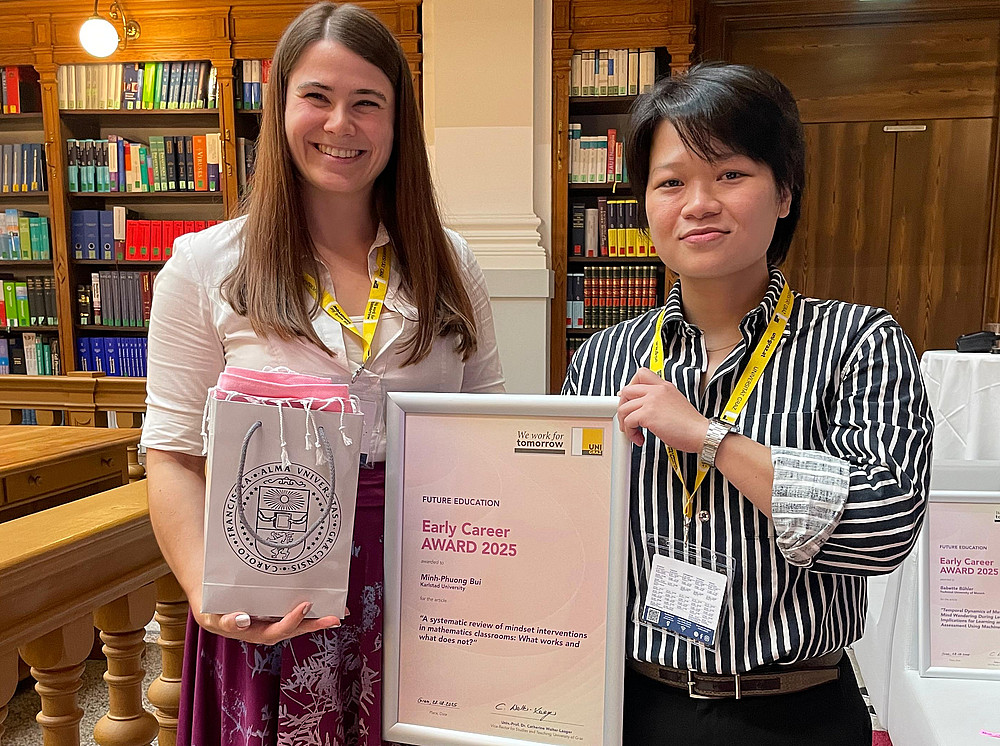
Minh-Phuong Bui
Paper: "A systematic review of mindset interventions in mathematics classrooms: What works and what does not?"
FUTURE EDUCATION Award - MINT+ for the sustainable development of our society
Dr. Phuong Bui is an interdisciplinary researcher in educational technology and mathematics
education, focusing on how digital tools can be designed and integrated to support learning. She defended her doctoral dissertation at the University of Turku, Finland in September 2023.
The overarching goal of her PhD is to identify design principles for learning environments that foster flexible mathematical thinking, emphasizing the importance of deliberate practice and a growth mindset for achieving adaptive expertise in mathematics education. Recently, her focus has expanded to include Generative Artificial Intelligence (GenAI) and its implications for both research methodologies and educational practices, specifically exploring human-AI collaborative frameworks across diverse educational contexts.
In 2024, Dr. Bui secured funding from the Finnish Cultural Foundation for her research investigating Gen AI Readiness among pre-service teachers in Finland. This longitudinal investigation is conducted in collaboration with Digi-ERKO, a specialized national in-service teacher training program in Finland designed to develop expert teachers in digital learning environments. At Karlstad University, Dr. Bui leads two internal projects examining the integration of Gen AI technologies within mathematics education in higher education.
Babette Bühler
"Temporal Dynamics of Meta-Awareness of Mind Wandering During Lecture Viewing: Implications for Learning and Automated Assessment Using Machine Learning"
FUTURE EDUCATION Award 2025 - Educational technology(ies): interdisciplinary, innovative, disruptive
Dr Babette Bühler has been a postdoctoral researcher for human-centred technologies for learning at the Technical University of Munich since August 2024 . She received her PhD in Computer Science from the University of Tübingen (2024) with a thesis on multimodal machine learning for automated assessment of attention-related processes. Previously, she earned an M.Sc. in Data Science (2020) and a B.A. in Sociology (2016) at the University of Mannheim.
Her research focuses on attention-aware and adaptive AI-powered learning technologies that utilise multimodal machine learning and large-scale language models. She develops models for multimodal mind-wandering recognition and video-based hand signal recognition in the classroom and is involved in the development of AI literacy workshops for school children.
As a teacher, Dr Babette Bühler is active in areas such as machine learning in education and social sciences, artificial intelligence in education and human-AI interaction. She leads and co-leads seminars and project weeks on the development of AI-supported educational interventions and supervises bachelor's, master's and doctoral theses. She is also involved in mentoring female students and scientists.
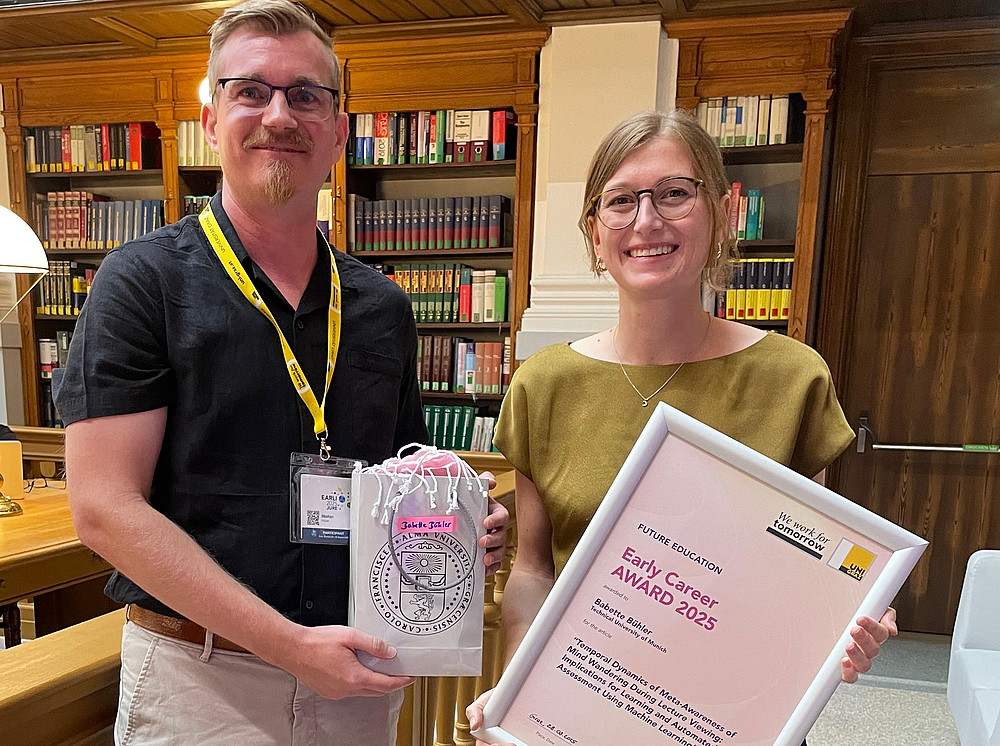
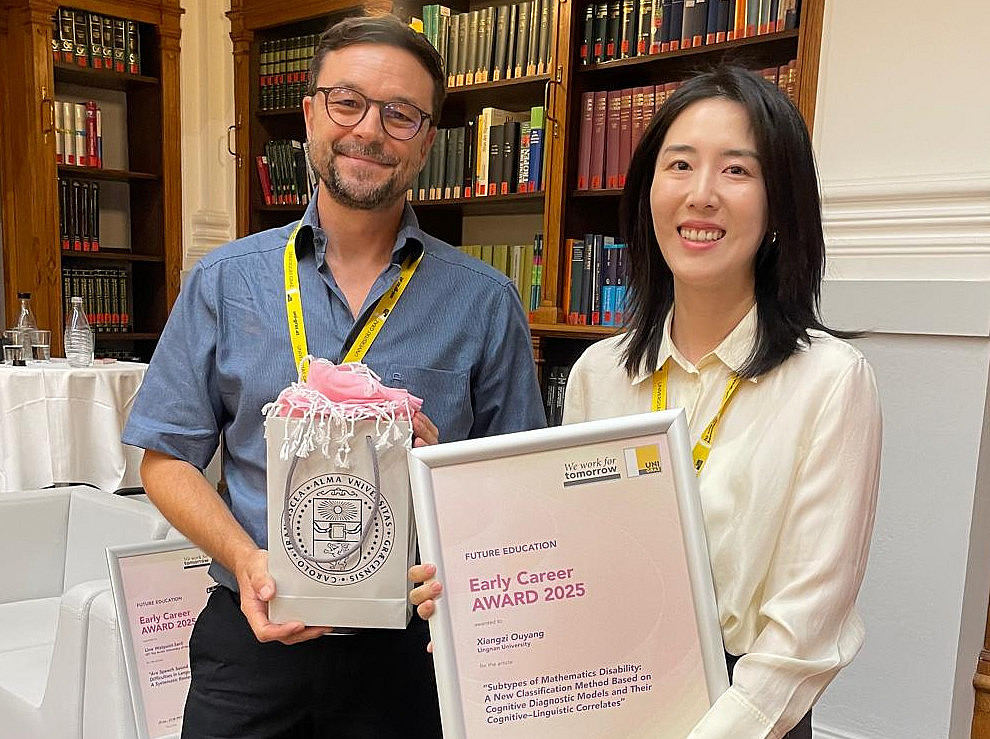
Xiangzi Ouyang
"Subtypes of Mathematics Disability: A New Classification Method Based on Cognitive Diagnostic Models and Their Cognitive-Linguistic Correlates"
FUTURE EDUCATION Award 2025 - Plurality and diversity in educational processes
Xiangzi Olivia OUYANG has been an assistant professor in the Department of Psychology at Lingnan University since 2023 . Previously, she was a postdoctoral researcher at the Department of Psychology, University of Hong Kong from 2022 to 2023. Her academic career includes a Ph.D. from the Faculty of Education of the University of Hong Kong (2018-2022), an M.Ed. from the School of Psychology of Beijing Normal University (2013-2016) and a B.Sc. from the College of Finance and Statistics of Hunan University (2009-2013).
Dr Ouyang's research primarily focuses on children's cognitive development, with a particular focus on cognitive and environmental factors that influence children's mathematical learning, academic emotions and mathematical learning difficulties. She also has a strong interest in the application of psychological statistics and psychometrics, particularly in the context of children's mathematical development. She has been Principal Investigator on several research projects including the Early Career Scheme on Spatial Ability and Numeracy in Young Children (2025-2028), and projects on validation studies and antecedents of mathematical difficulties in pre-school children funded by Faculty Research Grants from Lingnan University. Her PhD project focused on subtypes of mathematical learning disabilities.
Her teaching experience includes courses such as Introduction to Psychology, Educational Psychology, Stress Management, and Health and Life Balance, with a teaching evaluation of 5.71/6, above the departmental average. She has also worked as a Teaching Assistant for Longitudinal Methods.
Her awards include the Research & Knowledge Transfer Fund Award from Lingnan University (2024), a Doris Zimmern HKU-Cambridge Hughes Hall Fellowship (2023) to visit the University of Cambridge, and several Conference Support Grants and Excellent Paper Awards from Beijing Normal University. She also serves as a reviewer for various journals in the field of early childhood research.
- Paper: "Subtypes of Mathematics Disability: A New Classification Method Based on Cognitive Diagnostic Models and Their Cognitive-Linguistic Correlates"
- Xiangzi Ouyang on ORCID
- Interview with the prizewinner Xiangzi OUYANG on the homepage of the University of Lignan (in English)
Line Walquist Sørli
"Are Speech Sound Difficulties Risk Factors for Difficuities in Language and Reading Skills? A Systematic Review and Meta-Analysis"
FUTURE EDUCATION Award 2025 - Language(s) as a tool for social participation
Line Walquist Sørli has been a doctoral candidate in special education at UiT - The Arctic University of Norway since January 2022 . Her dissertation is entitled "Childhood Speech Sound Development and Difficulties: Relationship with Language and Reading".
In addition to her doctoral research, she has been a PhD candidate in the UiT-ReadWell projectsince January 2022 , where she is conducting research as part of a randomised controlled intervention study aimed at improving reading comprehension in Norwegian children with reading difficulties. Since January 2024, she has also worked as a speech-language pathologist in private practice, where she provides assessment and intervention services for children and adults with speech, language, voice, fluency (stuttering) or dysphagia difficulties. Previously, she was a Master's student in Speech-Language Pathology at the same university from August 2017 to December 2020.
Her professional experience also includes a position as a consultant for child language and reading development in an inter-municipal network in Northern Norway (2023), where she advised teachers on supporting language and reading development and conducted workshops to improve reading and writing skills.
She also has experience as a teacher and special education coordinator at Fagerlidal Skole (2017-2022), where she coordinated special education programmes and developed IEPs (Individualised Education Plans). Previously, she taught middle school students at Olsborg Skole (2016-2017) and worked as a Norwegian teacher for adults, including immigrants and refugees (2010-2016).
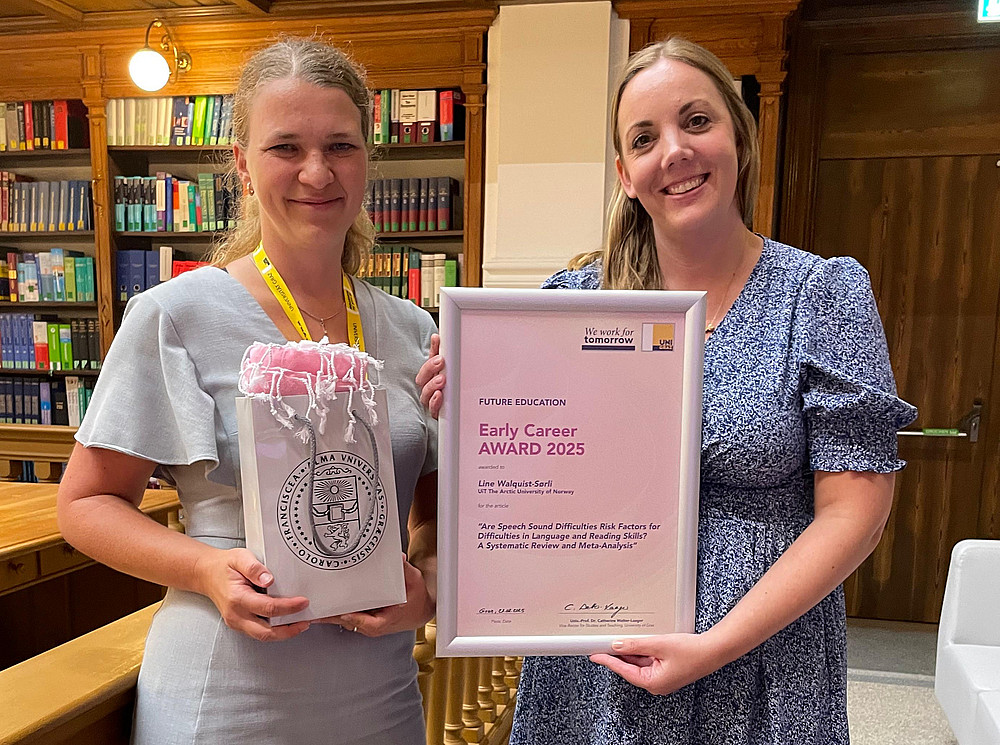
The FUTURE EDUCATION Award 2025 honours excellent transdisciplinary research articles by young scientists from the fields of education, learning, development and teaching. The award will be presented at the EARLI Conference 2025 in Graz. One prize (maximum) will be awarded per research cluster, each endowed with 1,000 euros. In addition, the award winners and their work will be presented in detail on the FUTURE EDUCATION website.
Eligibility Criteria
- The article must be published in a peer-reviewed journal;
- The article must be written in English;
- The publication date of the article must be during the PhD studies or within two years after obtaining the PhD;
- Only papers published from 2023 onwards will be accepted;
- The proponent must be the corresponding author of the article (the first author may submit with permission from the corresponding author);
- The research adresses topics in the field of education, learning, development and teaching;
The proponent participates in the EARLI 2025 Conference in Graz, where the award ceremony will take place.
Evaluation Criteria
- Transdisciplinary approach: Research integrates methods, theories and/or frameworks from two or more disciplines.
- Innovation and originality: Submission presents novel ideas, methods and/or results that advance research related to education, learning, development and teaching.
- Research excellence: The applied research methods are state-of-the-art.
Implications for educational practice: The obtained findings have implications for educational practice.
Submission Guidelines
- The completed nomination form (PDF);
- A digital copy (PDF) of the published article.
Nominations must be received by the 15th of April 2025 (midnight CEST) via ConfTool from 1st of March 2025. The winner information will be provided by the 30th of May 2025.
Review process and award presentation
In a first step, all submissions are screened whether they meet the eligibility criteria. Those who meet these criteria are scored by two independent researchers with regard to the evaluation criteria. Based on the mean ratings in these criteria, the highest-scoring articles are selected for the award. For each research cluster of the FUTURE EDUCATION program a maximum of one award will be presented.
The research clusters are:
- Pluralism and diversity in educational processes
- Languages as a tool for social participation
- Educational technologies: interdisciplinary, innovative, disruptive
- STEM+ for the sustainable development of our society
The award will be presented during the EARLI 2025 Conference in Graz by the scientific board of the FUTURE EDUCATION program of the University of Graz.
Each award is endowed with EUR 1,000. In addition, a special feature on the FUTURE EDUCATION website on the award winners and their work will be published.
Important dates
| Call for Nominations | 02/2025 |
| Open for submissions (via ConfTool) | 01.03.2025 |
| Submission Deadline | 15.04.2025 (midnight CEST) |
| Winner Information | 30.05.2025 |
| FUTURE EDUCATION Award Ceremony @ EARLI 2025 | 28.08.2025 |